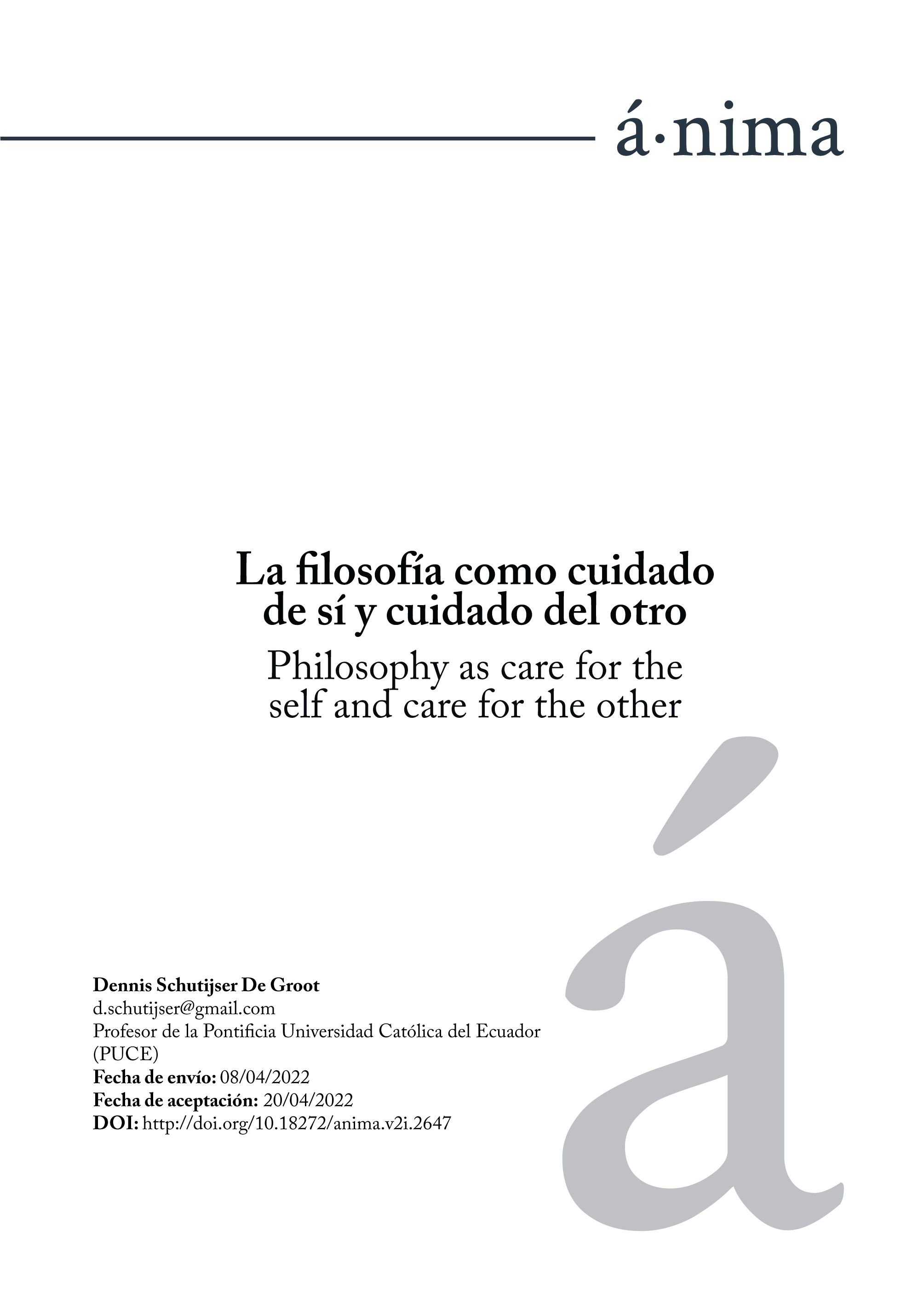Philosophy as care for the self and care for the other
DOI:
https://doi.org/10.18272/anima.v2i.2647Keywords:
care of the self, care of the other, happiness, meaning, vulnerability, fragilityAbstract
The present article presents the common themes with regards to philosophy as care. The first distinction is between care for the self and care for the other. Within the framework of philosophy as care for the self, a next distinction is between a focus on different forms of happiness on the one hand; and a focus on the question of meaning on the other. Within the framework of philosophy as care for the other, a further distinction is between care for the other based on a shared vulnerability and the accompanying requirement to attend to the other in caring for themselves; and on a personal fragility in the face of the other and the appeal to our responsibility to care for the other.
The aim of the article, beyond presenting a short presentation of the most important current debates about philosophy as care, is to show that in many ways such a concept of care from a philosophy standpoint will trump expectations and present philosophy as a practice that rather disrupt, problematizes and subverts common care practice, rather than reinforce it.
Downloads
References
Aristóteles. Ética Nicomaquea. Gredos, 1985.
Baumeister, Roy. Meanings of Life. Guilford, 1991.
Boecio, Anicio Manlio. La consolación de la filosofía. Aguilar, 1960.
Dreyfus, Hubert L. & Rabinow, Paul. Michel Foucault: más allá del estructuralismo y la hermenéutica. Nueva Visión, 2001.
Epicuro. Obras. Tecnos, 2005.
Foucault, Michel. La hermenéutica del sujeto: Curso en el College de France (1981-1982). Fondo de Cultura Económica, 2011.
Foucault, Michel. Historia de la sexualidad: el uso de los placeres. Siglo XXI, 2010.
Foucault, Michel. Historia de la sexualidad: la inquietud de sí. Siglo XXI, 2010.
Foucault, Michel. Estética, ética y hermenéutica. Paidós, 1999.
Frankl, Viktor. El hombre en busca de sentido. Herder, 2004.
Gilligan, Carol. In a Different Voice. Psychological Theory and Women"™s Development. Harvard University Press, 1982.
Hadot, Pierre. Ejercicios espirituales y filosofía antigua. Siruela, 2006.
Hadot, Pierre. ¿Qué es la filosofía antigua? Fondo de Cultura Económica, 1998.
Heidegger, Martin. El ser y el tiempo. Fondo de Cultura Económica, 1993 [1927].
Heidegger, Martin. Carta sobre el humanismo. Alianza, 2000 [1967].
Lévinas, Emmanuel. Ética e infinito. Machado, 1991.
Lévinas, Emmanuel. De otro modo que ser o más allá de la esencia. Sígueme, 2003.
Lévinas, Emmanuel. Totalidad e infinito. Ensayo sobre la exterioridad. Sígueme, 2002.
Lyotard, Jean-François. La condición postmoderna. Minuit, 1985.
Marco Aurelio. Meditaciones. DeAgostini, 1997.
Nietzsche, Friedrich. La gaya ciencia. Mediodía, 1967.
Noddings, Nel. Caring. A Relational Approach to Ethics & Moral Education. University of California Press, 1984.
Ricoeur, Paul. Si mismo como otro. Siglo Veintiuno, 2006.
Ricoeur, Paul. Tiempo y narración III. El tiempo narrado. Siglo XXI, 1996.
Séneca, Lucio Anneo. De la brevedad de la vida. Aguilar, 1977.
Tronto, Joan C. Moral Boundaries. A Political Argument for an Ethic of Care. Routledge, 1993.
Yalom, Irvin. Psicoterapia existencial y terapia de grupo. Paidós, 2000.

Downloads
Published
How to Cite
Issue
Section
License
Los autores que publiquen en la revista aceptan los siguientes términos:
- Los autores conservarán sus derechos de autor y garantizarán a la revista el derecho de primera publicación de su obra, la cual estará simultáneamente sujeto a la Licencia de reconocimiento de Creative Commons que permite a terceros compartir la obra siempre que se indique su autor y su primera publicación esta revista.
- Los autores podrán adoptar otros acuerdos de licencia no exclusiva de distribución de la versión de la obra publicada, pudiendo de esa forma publicarla en un volumen monográfico o reproducirla de otras formas, siempre que se indique la publicación inicial en esta revista.
- Se permite y se recomienda a los autores difundir su obra a través de Internet:
- Antes del envío a la revista, los autores pueden depositar el manuscrito en archivos/repositorios de pre-publicaciones (preprint servers/repositories), incluyendo arXiv, bioRxiv, figshare, PeerJ Preprints, SSRN, entre otros, lo cual puede producir intercambios interesantes y aumentar las citas de la obra publicada (Véase El efecto del acceso abierto).
- Después del envío, se recomiendo que los autores depositen su artículo en su repositorio institucional, página web personal, o red social científica (como Zenodo, ResearchGate o Academia.edu).





